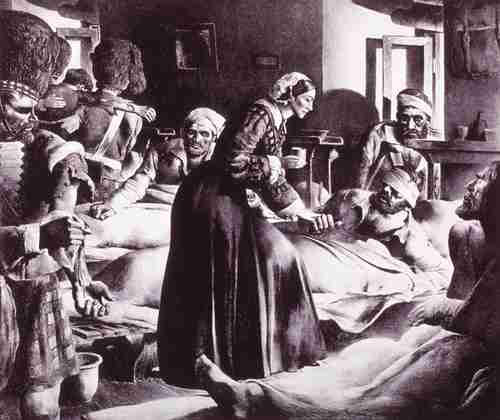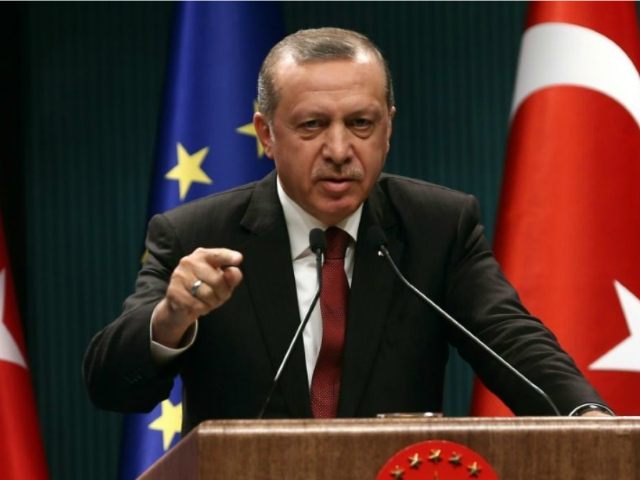This morning’s key headlines from GenerationalDynamics.com
- Putin calls Turkey’s downing of Russian plane a ‘stab in the back’
- Turkmen in Syria versus Russians in occupied Crimea
- Russia – Turkey crisis evokes memories of centuries of Crimean wars
Putin calls Turkey’s downing of Russian plane a ‘stab in the back’

Florence Nightingale, the world’s first nurse, tending to wounded soldiers during the Crimean War in 1854
On Tuesday, two Turkish F-16s were involved in the shooting down of a Russian warplane in Syria near the border with Turkey. According to Turkey’s military, the Russian aircraft was warned 10 times in five minutes that it was violating Turkish airspace.
In addition, one of the Russian pilots was shot dead from the ground by ethnic Turkmens as he was parachuting to earth. A Russian marine was also shot down during the rescue operation.
Russia’s president Vladimir Putin called Turkey’s downing of the fighter jet “a stab in the back” carried out by the accomplices of terrorists, alluding to previous accusations that Turkey’s government were accomplices of the so-called Islamic State (IS or ISIS or ISIL or Daesh). Putin said that the incident would have serious consequences for the two countries’ relations.
Turkey’s prime minister Ahmet Davutoglu said that Turkey had the right to respond if its airspace is violated despite repeated warnings.
Russia claims that the Russian plan was shot down over Syria, but that even if it had invaded Turkey’s air space, then shooting it down was illegal. According to Anatoly Kapustin, President of the Russian Association of International Law: “Even if the Russian plane flew into Turkish airspace and returned to Syria, it needs to be taken into account that the Russian air force is taking part in an armed conflict in Syrian territory, on the side of the central government.”
Other analysts have also suggested that shooting down the warplane was an overreaction, since it was not a danger to Turkey even if it invaded Turkey’s airspace.
Russia’s Defense Ministry said that it was working on a package of measures to respond to the incident. A Russian warship will be deployed to waters off Syria’s western Latakia province, and Russian fighters will accompany bombing missions in the future. Russia’s Foreign Minister Sergei Lavrov advised Russians not to visit Turkey, saying that the threat of terrorism was as bad in Turkey as in Egypt, where a Russian passenger plane was recently blown out of the sky. Sputnik News (Moscow) and Hurriyet Daily News (Ankara)
Turkmen in Syria versus Russians in occupied Crimea
When Russian troops last year invaded, occupied, and annexed Ukraine’s Crimea peninsula, and also invaded and occupied eastern Ukraine, the excuse given by Vladimir Putin was that Russia has the right to protect ethnic Russians wherever they may be.
So now it is possible that this same argument is being used against Russia. As has been widely reported, Russian warplanes have not been bombing ISIS targets. Instead, they have been bombing so-called “moderate” rebels fighting against Syria’s president Bashar al-Assad, including some groups being supported by the United States.
Some of those moderate rebels are in ethnic Turkmen villages that the Russians have bombed. Turkey last week summoned the Russian ambassador to protest the bombing of Turkmens in Syria. Turkmens were originally from Turkmenistan in Central Asia.
On Tuesday, Turkey’s president Recep Tayyip Erdogan said:
Everyone should respect Turkey’s right to defend its own borders… We strongly condemn attacks focusing on the places where Bayirbucak Turkmens live. We have relatives and cognates living there.
Erdogan pointed out that there were no ISIS militants in the Turkmen region.
In fact, Crimea is the homeland of the ethnic Tatars, who are also (distant) relatives of the Turks, with the same Muslim religion, and Tatars are being brutally treated by the Russians in occupied Crimea. So, from Turkey’s point of view, Turkey has as much right to protect the Tatars in occupied Crimea as Russia has to protect the Russians.
It is possible, though unstated, that Erdogan felt that Turkey had the right to shoot down the Russian warplane in defense of the Turkmens in Syria. Today’s Zaman (Istanbul) and CNN
Russia – Turkey crisis evokes memories of centuries of Crimean wars
There has been a lot of talk in the media about how Turkey and Russia are such potentially great allies, and that if they could only get past a minor issue or two, then together they could take down ISIS. Such fatuous statements miss the point that the Turkish and Russian people deeply hate each other, based on centuries of extremely bloody wars, often centered on the Crimean peninsula which has been so much in the news for the last two years.
If you want to list the most important wars of the last millennium, one might mention the cataclysmic Mongol conquest of the Han Chinese in 1206, the War of the Spanish Succession that climaxed in 1709, the American Revolution that climaxed in 1782, and the cataclysmic Zulu conquest of tribes of southern Africa in the 1820s.
However, the top of the list is arguably the cataclysmic conquest of Constantinople, the capital of the Byzantine empire, by the Muslim Ottoman Turks in 1453, renaming the city to Istanbul.
In 1472, Russia’s Grand Prince Ivan III (“Ivan the Great”) married Sophia, the orphan niece of the last Greek Emperor of Constantinople. At that time, with the destruction of Rome by the Visigoths, and the destruction of Constantinople by the Ottomans, Ivan the Great decided that Moscow was going to become “the third Rome,” the home of the true (or “orthodox”) Christian faith, and the defender of Jerusalem from the Ottomans. He gave himself the title “Czar” or “Tsar,” derived from the name of the Roman Emperor Caesar (as is the German word “Kaiser”).
The Tatars were a tribe of Mongols that, under the leadership of Genghis Kahn, probably the greatest conqueror in the history of the world, had defeated China in 1217, and then turned westward and conquered much of southern Russia by 1227, where they adopted Crimea as their homeland. The Crimean Tatars had intermingled with the central Asian Turks, and spoke a Turkish language. By the 1400s, they adopted Islam as their religion.
So here is a brief summary of what happened since then:
- In 1571, the Crimean Tatars attacked and sacked Moscow, while Russia was fighting the Livonian war against Poland, Sweden and Denmark, and had to be driven back by Ivan the Great’s grandson, Ivan the Terrible, who had become Tsar in 1547.
- In 1783, Russia under Catherine the Great annexed Crimea in a war in which the Ottomans were defeated. The peace treaty (at Kuchuk Kaynarja) was extremely humiliating to the Ottomans, as it gave Russia the right to build an Orthodox Christian church in Istanbul and to protect Orthodox Christians in Istanbul. This right to protect “the church to be built in Constantinople and those who service it” was used by the Russians to become the protector of all Orthodox Christians living under Ottoman control. This proved to be a blank check for Russian interference in Ottoman affairs.
- The Crimean War (1853-55) was a disaster for both the Russians and the Turks, though more so for the Russians, who lost Crimea and other territories on the Black Sea. England and France were on the side of the Ottomans. (“Into the valley of Death rode the six hundred” is the well-known line from Lord Alfred Tennyson’s poem, The Charge of the Light Brigade, describing the results of one particularly gruesome battle of the war, where 600 English soldiers were massacred.) After the war, the English and France remained heavily involved in Turkey’s affairs.
- World War I saw the destruction of Russia’s Tsarist empire and Turkey’s Ottoman Empire. WWI was the generational crisis war for both countries, not WWII.
- Special mention should be made of Russia’s recent history with Ukraine and Crimea: First, 7 million peasants died in Joseph Stalin’s man-made famine in the 1930s. Next, when World War II began, Hitler invaded and occupied Ukraine, killing 5 million more people. Hitler withdrew from Ukraine in 1944, but then Stalin deported 200,000 Crimean Tatars to Siberia. In recent years, descendants of the deported Crimeans have been demanding the right to reclaim their grandparents’ land in Crimea, which is one of the reasons why Russia is treating Tatars harshly today.
Western politicians and journalists are pretty much oblivious to all of this. But you can be sure that both Erdogan and Putin are fully aware of it. And with all this history between them, and with Russia now having occupied and annexed Crimea, there is no possibility Russia and Turkey are going to become allies in any meaningful sense.
Long-time readers are aware that I have been writing for ten years that Generational Dynamics predicts the world is headed for a Clash of Civilizations world war, where the allies of the U.S. will including India, Russia and Iran, while the enemies, led by China, will include Pakistan and the Sunni Muslim countries.
The Turkish downing of a Russian warplane to provide protection of Turkmen villages in Syria will certainly be an important milestone in bringing that prediction to actualization. Russia is certain to retaliate in some way, although it’s not expected that Russia and Turkey will go to war at this time, since there are diplomatic efforts going on around the world.
Because of this crisis and the Syrian refugee crisis, in a move described by Turkish journalists as “panicked,” the European Union has called an EU-Turkey summit meeting in Brussels on Sunday. This will be the first such summit meeting since the EU and Turkey began their tumultuous relationship in 1959.
According to Donald Tusk, president of the European Council, the summit will be held between the 28 member countries and Turkey, and the topics to be discussed will certainly include the Turkey-Russia crisis, as well as new discussions of Turkey joining the EU, and how to stem the flow of refugees from Turkey into Greece. Today’s Zaman (Istanbul) and Generational Dynamics: History of Islam versus Orthodox Christianity (2003)
KEYS: Generational Dynamics, Florence Nightingale, Ukraine, Crimea, Russia, Vladimir Putin, Turkey, Recep Tayyip Erdogan, Ahmet Davutoglu, Islamic State / of Iraq and Syria/Sham/the Levant, IS, ISIS, ISIL, Daesh, Anatoly Kapustin, Russian Association of International Law, Sergei Lavrov, Syria, Bayirbucak Turkmens, Turkmenistan, Byzantine Empire, Constantinople, Istanbul, Ottomans, Ivan the Great, Ivan the Terrible, Orthodox Christianity, Genghis Kahn, Mongols, Genghis Kahn, Catherine the Great, Kuchuk Kaynarja, Lord Alfred Tennyson’s poem, The Charge of the Light Brigade, European Union, Donald Tusk, European Council
Permanent web link to this article
Receive daily World View columns by e-mail

COMMENTS
Please let us know if you're having issues with commenting.